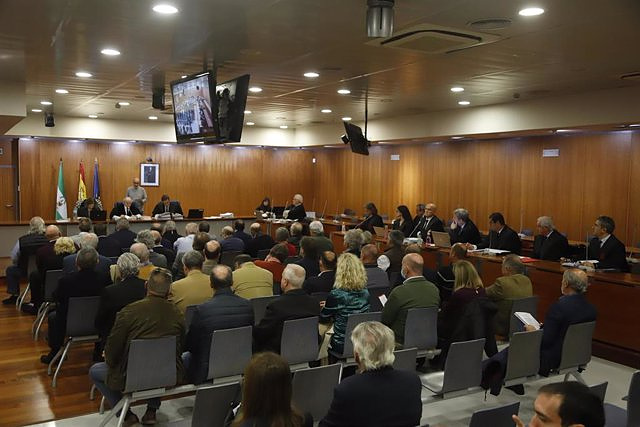He says he has no doubts about the legality of the evidence or about the complainants
MÁLAGA, 16 Ene. (EUROPA PRESS) -
The representative of the Prosecutor's Office in the 'Astapa' case, on the alleged political and urban corruption in Estepona (Málaga), has defended the investigation and has assured that "the prosecutor has no doubts about the legality of the evidence". He has rejected the conspiracy theory that former commissioner José Manuel Villarejo orchestrated this operation, although he has urged his participation to be seen in the trial. "I am not afraid of discovering the truth and if I have been wrong I will act accordingly," he pointed out.
"The trial is necessary and must be held," said the prosecutor Valentín Bueno in his response to the allegations raised by the defenses last week, for which he has rejected the suspension to carry out complementary evidence and also the nullity raised, because there was " strong assumptions" to justify wiretaps, which meet the necessary requirements. In addition, he has defended the complaint and the complainants.
The investigation in this case began as a result of a complaint filed by two councilors, David Valadez --who later became mayor-- and Cristina Rodríguez--, both from the PSOE, a formation that then governed the town together with the PES. There are 50 defendants - although for some the statute of limitations has been estimated and another has reached an agreement in principle - and crimes of bribery, money laundering, embezzlement, fraud and prevarication have been investigated.
Regarding Villarejo, the prosecution says that there are facts that it does not dispute, such as that when the investigation began "his professional prestige was intact", that he had links to Estepona and investments there and contacts with the new mayor --Valadez-- and the manager of Town planning; but he says that he does not know if others occurred or not, such as whether he intervened in the filing of the complaint in Madrid or why Valadez appointed that manager, a person supposedly related to the ex-commissioner.
On the other hand, for the public ministry, the theory that 'Astapa' "was a political operation ordered from the Interior, that there were secret meetings and illegal punctures or that police reports were manipulated" is "unfounded"; and, faced with that, he has presented an "alternative" thesis, which in his opinion should be "ventilated in this trial."
In this regard, he explained that his theory is based in the first place on the fact that the facts of the complaint "are true and would have existed with or without Villarejo", that he "took advantage of his position to keep abreast of the investigation, but never controlled it ", in addition to the fact that "he took advantage of the situation to favor his real estate interests in Estepona and provide activity to one of his companies."
"What I am saying is that it is easy to fish in a troubled river", the representative of the Prosecutor's Office has had an impact, who has said that he is "acknowledging that there were irregularities, but never that there was a bankruptcy of the Rule of Law; what happened here could happen in any Western country because corruption is latent everywhere. In this case the rule of law was the 'Tandem' operation."
Thus, he has ensured that the pending issues "can be found out in the trial without the need to suspend it and provide additional information." For this reason, he has reiterated his request for a new block to address these issues related to the origin of the cause. "It is an evidentiary block, it is not to make evidence on the evidence, but on the origin of the evidence", she has had an impact, pointing out that "it is more necessary for the defenses than for the prosecutor".
Valentín Bueno has defended the "honesty" of the complainants and the validity of the claims in the complaint. In this sense, he recalled that the complainants pointed out that "the already known model of Marbella was followed, where all the agreements were negotiated in a certain office", pointing out that the 'Malaya' case "was something that worried the rulers of the Sunshine Coast".
Thus, it has indicated that they raised a series of "irregularities", which "could not be false", and that summarized in ten points, among them, the existence of a box B "that is nourished by contributions from businessmen", which presumably is eluded control and that the negotiation of agreements was done "not only from Urban Planning but also from the Mayor's Office."
They also referred to the existence of a "Box C, which is nourished by funds that enter without control"; to the hiring of one of the defendants who "monopolized the appraisals of use despite the fact that there were more qualified officials for it", the suspicions about underestimation of at least ten agreements, "with a million-dollar patrimonial damage"; and the "notable enrichment of certain politicians."
For this reason, he has insisted on the "objectivity of the evidence" provided in the complaint, which, subsequently, had three layers of corroboration, such as the public condition of the complainants and that "no one had anything to gain and much to lose"; the verification made by the Police, which identified the interveners and the facts; and the documentation that was intervened.
Likewise, he has defended judicial control, rejecting the idea of the defenses that the investigation was submitted to police guidelines, highlighting the professionalism of those who carried out this investigation. In addition, he has requested that the mitigation of undue delays be applied.
The prosecutor has considered the statute of limitations for the crime of bribery in three defendants, who nevertheless will continue in the case because they are accused of other crimes.

 Exploring Cardano: Inner Workings and Advantages of this Cryptocurrency
Exploring Cardano: Inner Workings and Advantages of this Cryptocurrency Seville.- Economy.- Innova.- STSA inaugurates its new painting and sealing hangar in San Pablo, for 18 million
Seville.- Economy.- Innova.- STSA inaugurates its new painting and sealing hangar in San Pablo, for 18 million Innova.- More than 300 volunteers join the Andalucía Compromiso Digital network in one month to facilitate access to ICT
Innova.- More than 300 volunteers join the Andalucía Compromiso Digital network in one month to facilitate access to ICT Innova.-AMP.- Ayesa acquires 51% of Sadiel, which will create new technological engineering products and expand markets
Innova.-AMP.- Ayesa acquires 51% of Sadiel, which will create new technological engineering products and expand markets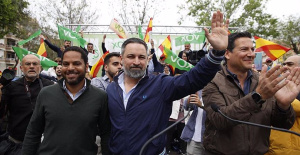 Abascal (Vox) criticizes that Sánchez is "victimizing" himself and calls for elections after his possible resignation
Abascal (Vox) criticizes that Sánchez is "victimizing" himself and calls for elections after his possible resignation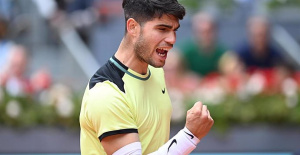 Carlos Alcaraz reaches the round of 16 in Madrid without breaking a sweat
Carlos Alcaraz reaches the round of 16 in Madrid without breaking a sweat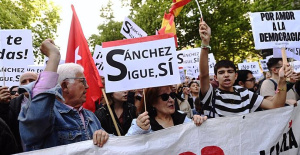 Some 5,000 people demonstrate in front of Congress for democracy, hours before Sánchez's decision
Some 5,000 people demonstrate in front of Congress for democracy, hours before Sánchez's decision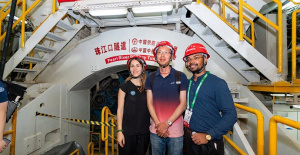 STATEMENT: Intelligent systems used in the construction of the deepest underwater tunnel in China
STATEMENT: Intelligent systems used in the construction of the deepest underwater tunnel in China How Blockchain in being used to shape the future
How Blockchain in being used to shape the future Not just BTC and ETH: Here Are Some More Interesting Coins Worth Focusing on
Not just BTC and ETH: Here Are Some More Interesting Coins Worth Focusing on UPV students build a prototype of a wooden house to move to Equatorial Guinea
UPV students build a prototype of a wooden house to move to Equatorial Guinea The UA opens the call for the Impulso 2024 Awards for the best innovative business initiatives
The UA opens the call for the Impulso 2024 Awards for the best innovative business initiatives ALI, virtual assistant from Alicante, internationally recognized by the OECD
ALI, virtual assistant from Alicante, internationally recognized by the OECD Retrópolis brings the golden age of video games and computing to the UPV
Retrópolis brings the golden age of video games and computing to the UPV A million people demonstrate in France against Macron's pension reform
A million people demonstrate in France against Macron's pension reform Russia launches several missiles against "critical infrastructure" in the city of Zaporizhia
Russia launches several missiles against "critical infrastructure" in the city of Zaporizhia A "procession" remembers the dead of the Calabria shipwreck as bodies continue to wash up on the shore
A "procession" remembers the dead of the Calabria shipwreck as bodies continue to wash up on the shore Prison sentences handed down for three prominent Hong Kong pro-democracy activists
Prison sentences handed down for three prominent Hong Kong pro-democracy activists ETH continues to leave trading platforms, Ethereum balance on exchanges lowest in 3 years
ETH continues to leave trading platforms, Ethereum balance on exchanges lowest in 3 years Investors invest $450 million in Consensys, Ethereum incubator now valued at $7 billion
Investors invest $450 million in Consensys, Ethereum incubator now valued at $7 billion Alchemy Integrates Ethereum L2 Product Starknet to Enhance Web3 Scalability at a Price 100x Lower Than L1 Fees
Alchemy Integrates Ethereum L2 Product Starknet to Enhance Web3 Scalability at a Price 100x Lower Than L1 Fees Mining Report: Bitcoin's Electricity Consumption Declines by 25% in Q1 2022
Mining Report: Bitcoin's Electricity Consumption Declines by 25% in Q1 2022 Oil-to-Bitcoin Mining Firm Crusoe Energy Systems Raised $505 Million
Oil-to-Bitcoin Mining Firm Crusoe Energy Systems Raised $505 Million Microbt reveals the latest Bitcoin mining rigs -- Machines produce up to 126 TH/s with custom 5nm chip design
Microbt reveals the latest Bitcoin mining rigs -- Machines produce up to 126 TH/s with custom 5nm chip design Bitcoin's Mining Difficulty Hits a Lifetime High, With More Than 90% of BTC Supply Issued
Bitcoin's Mining Difficulty Hits a Lifetime High, With More Than 90% of BTC Supply Issued The Biggest Movers are Near, EOS, and RUNE during Friday's Selloff
The Biggest Movers are Near, EOS, and RUNE during Friday's Selloff Global Markets Spooked by a Hawkish Fed and Covid, Stocks and Crypto Gain After Musk Buys Twitter
Global Markets Spooked by a Hawkish Fed and Covid, Stocks and Crypto Gain After Musk Buys Twitter Bitso to offset carbon emissions from the Trading Platform's ERC20, ETH, and BTC Transactions
Bitso to offset carbon emissions from the Trading Platform's ERC20, ETH, and BTC Transactions Draftkings Announces 2022 College Hoops NFT Selection for March Madness
Draftkings Announces 2022 College Hoops NFT Selection for March Madness